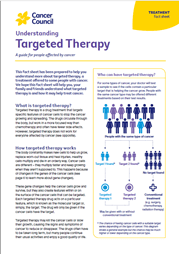- Home
- Cervical cancer
- Treatment
- Targeted therapy
Targeted therapy for cervical cancer
Targeted therapy is a drug treatment that attacks specific features of cancer cells to stop the cancer growing and spreading. It is used to treat cervical cancer that has spread to other parts of the body or has come back and cannot be treated by surgery or radiation therapy.
Bevacizumab is a type of targeted therapy that can be used to treat advanced cervical cancer. It is given with chemotherapy every 3 weeks through a drip into a vein (infusion). The total number of infusions you receive will depend on how you respond to the drug.
Side effects of targeted therapy
The most common side effects of taking bevacizumab include high blood pressure, feeling tired and loss of appetite. Less common side effects include bleeding, blood clots and problems with wound healing.
Rarely, bevacizumab has the potential to cause other more serious side effects, such as damage to the bowel (perforation) or the development of an abnormal opening between the vagina and another part of the body (fistula). Your doctor will discuss these possible side effects with you.
For more on this, see our general section on Targeted therapy or see the video and podcast below.
→ READ MORE: Immunotherapy for cervical cancer
Video: What are targeted therapy and immunotherapy?
Watch this short video to learn more about targeted therapy and immunotherapy
Podcast: Targeted Therapy and Immunotherapy
Listen to more of our podcast for people affected by cancer
More resources
Prof Martin Oehler, Director of Gynaecological Oncology, Royal Adelaide Hospital, and Clinical Professor, University of Adelaide, SA; Dawn Bedwell, 13 11 20 Consultant, Cancer Council QLD; Gemma Busuttil, Radiation Therapist, Crown Princess Mary Cancer Centre, Westmead Hospital, NSW; Dr Antonia Jones, Gynaecological Oncologist, The Royal Women’s Hospital and Mercy Hospital for Women, VIC; Angela Keating, Senior Psychologist, Royal Hospital for Women, NSW; Anne Mellon, Clinical Nurse Consultant – Gynaecological Oncology, Hunter New England Centre for Gynaecological Cancer, NSW; Dr Inger Olesen, Medical Oncologist, Andrew Love Cancer Centre, Barwon Health, Geelong, VIC; Dr Serena Sia, Radiation Oncologist, Fiona Stanley Hospital and King Edward Memorial Hospital, WA; A/Prof Megan Smith, Co-lead, Cervical Cancer and HPV Stream, The Daffodil Centre, Cancer Council NSW and The University of Sydney, NSW; Emily Stevens, Gynaecology Oncology Nurse Coordinator, Southern Adelaide Local Health Network, Flinders Medical Centre, SA; Melissa Whalen, Consumer.
View the Cancer Council NSW editorial policy.
View all publications or call 13 11 20 for free printed copies.



